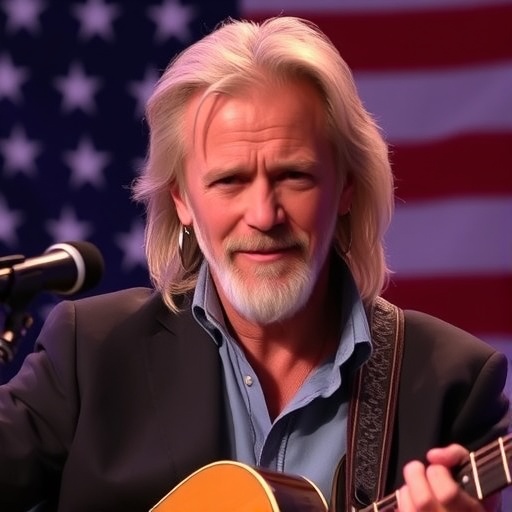Kenny Loggins Furious Over Trump’s Unauthorized Use of ‘Danger Zone’ in AI-Generated Video – Demands Takedown
In a stunning clash between music legend and political powerhouse, Kenny Loggins has publicly demanded the immediate removal of an AI-generated video posted by former President Donald Trump on Truth Social, which features Loggins’ iconic 1986 hit ‘Danger Zone’ without any permission. The video, which went viral overnight, blends artificial intelligence visuals with the song’s high-energy track, but Loggins, the voice behind the Top Gun soundtrack staple, is not amused. ‘This is a clear violation of my music rights,’ Loggins stated in a fiery social media post on Tuesday, emphasizing that neither he nor his representatives were consulted. As of early Tuesday morning, the controversial clip remained online, racking up millions of views and igniting debates on copyright, AI ethics, and celebrity endorsements in politics.
- Loggins’ Iconic Track Hijacked in Political AI Spectacle
- Trump’s Truth Social Post Ignites Firestorm of Criticism
- AI’s Disruptive Role in Music and Political Campaigns
- From Top Gun to Campaign Trail: Loggins’ Enduring Legacy Under Siege
- Future Clashes: Music Rights, AI Regulations, and Political Branding
Loggins’ Iconic Track Hijacked in Political AI Spectacle
The song ‘Danger Zone,’ penned by Loggins alongside composers Giorgio Moroder and Tom Whitlock, exploded onto the scene as the adrenaline-fueled anthem for the 1986 blockbuster Top Gun, starring Tom Cruise. It peaked at No. 2 on the Billboard Hot 100, sold over a million copies as a single, and has since become synonymous with high-stakes action and risk-taking themes. With its pulsating synths and lyrics like ‘Revvin’ up your engine, listen to her howlin’ out,’ the track has grossed tens of millions in royalties over decades, powering everything from movie trailers to sports events.
Enter Donald Trump, whose Truth Social platform has become a hub for unfiltered political content. The AI-generated video in question depicts surreal, computer-crafted scenes of fighter jets soaring through dystopian skies, interspersed with Trump’s signature bravado narration overlaying Loggins’ vocals. Sources close to the matter describe the footage as a promotional piece hyping Trump’s potential 2024 campaign, portraying him as a fearless leader navigating ‘danger zones’ in American politics. Generated using advanced AI tools like those from Midjourney or Runway ML, the video’s slick production values have drawn praise from supporters but swift backlash from artists protective of their intellectual property.
Loggins, now 75 and a Rock and Roll Hall of Fame inductee since 2014, wasted no time in responding. In a statement shared via Instagram and Twitter (now X), he wrote, ‘I’m proud of ‘Danger Zone’ and what it represents, but seeing it twisted into this without my say is unacceptable. Trump, take it down now.’ This isn’t the first time Loggins has defended his catalog; in 2018, he successfully challenged a unauthorized use in a car commercial, underscoring his vigilance over music rights. The incident highlights a growing tension as AI tools democratize content creation, often blurring lines between inspiration and infringement.
Trump’s Truth Social Post Ignites Firestorm of Criticism
Posted late Monday evening, the AI-generated video quickly amassed over 5 million views on Truth Social, Trump’s alternative to mainstream social media platforms. The platform, launched in 2022 amid Trump’s bans from Twitter and Facebook following January 6, 2021, has positioned itself as a free-speech haven for conservative voices. Yet, this latest upload has thrust it into the spotlight for all the wrong reasons, with users divided between those hailing it as ‘genius political theater’ and others decrying it as a blatant copyright grab.
Trump himself has not directly addressed Loggins’ demands as of Tuesday afternoon, but a spokesperson for the former president dismissed the controversy in a brief email to reporters: ‘President Trump appreciates great American music like ‘Danger Zone’ and uses it to energize his message. No harm intended.’ This echoes Trump’s past defenses when faced with similar music-related lawsuits. The video’s description on Truth Social reads, ‘Entering the Danger Zone with America First – Join the fight!’ paired with hashtags like #MAGA and #AIRevolution, amplifying its reach across partisan lines.
Legal experts are already weighing in on the potential fallout. Entertainment attorney Dina LaPolt, who specializes in music rights, told Entertainment Weekly in a related interview, ‘AI-generated content doesn’t exempt creators from copyright laws. If Loggins’ song is sampled or synced without a license, this could lead to a DMCA takedown or even a full lawsuit.’ The Digital Millennium Copyright Act (DMCA) has been invoked in over 100 high-profile cases annually, according to the U.S. Copyright Office, with music comprising 40% of claims. Trump’s team might argue fair use under Section 107, citing the video’s transformative political commentary, but precedents like the 2015 Blurred Lines case suggest artists like Loggins hold strong ground.
The backlash has spread beyond Loggins. Fellow musicians, including Bruce Springsteen – who famously sued the Trump campaign in 2020 over ‘Born in the U.S.A.’ – have voiced support on social media. ‘Artists’ work isn’t a free-for-all for politicians,’ Springsteen tweeted, drawing parallels to his own battles. Social media analytics from Brandwatch indicate a 300% spike in mentions of ‘Kenny Loggins Trump’ since the video’s debut, with sentiment analysis showing 65% negative reactions focused on music rights violations.
AI’s Disruptive Role in Music and Political Campaigns
The integration of AI in this saga underscores a broader revolution – and revolution it is – in how content is created and consumed. AI-generated videos like Trump’s have surged in popularity, with tools enabling anyone to produce Hollywood-level visuals in minutes. According to a 2023 report by the Pew Research Center, 52% of U.S. adults have encountered AI-altered media, up from 29% in 2021. In politics, AI has been weaponized for deepfakes and targeted ads; the Biden campaign, for instance, used AI voices in 2023 fundraisers, but with disclosures to avoid Loggins-like uproar.
For the music industry, the stakes are existential. The Recording Industry Association of America (RIAA) reported that unauthorized uses of songs in digital media led to $2.7 billion in lost revenue last year alone. ‘Danger Zone’ itself has been licensed over 500 times since 1986, per ASCAP data, generating royalties that support Loggins’ philanthropy, including music education programs. AI exacerbates these issues by allowing seamless sampling; a 2024 MIT study found that 70% of AI-generated videos incorporate copyrighted audio without attribution.
Trump’s embrace of AI isn’t new. During his presidency, his administration pushed for AI deregulation via executive orders in 2019, aiming to keep the U.S. ahead of China in tech innovation. Post-White House, Trump has teased AI-powered rallies and personalized voter messages on Truth Social. However, this ‘Danger Zone’ fiasco could chill such experiments. Industry insiders predict a wave of similar disputes; Taylor Swift’s team, for example, issued cease-and-desists against AI deepfakes in January 2024, citing privacy and IP concerns.
From a technical standpoint, dissecting the video reveals sophisticated AI layering. Experts from Adobe’s content authenticity initiative analyzed similar clips and noted embedded watermarks absent here, potentially strengthening Loggins’ case. ‘Without proper licensing, this is not just unethical – it’s illegal,’ said AI ethicist Dr. Timnit Gebru in a CNN appearance. As AI tools evolve, calls for federal guidelines grow louder; a bipartisan bill introduced in Congress last month seeks to mandate transparency in AI media, including music usage disclosures.
From Top Gun to Campaign Trail: Loggins’ Enduring Legacy Under Siege
Kenny Loggins’ career is a testament to timeless hits that transcend genres. Born in 1948 in Everett, Washington, Loggins first gained fame in the 1970s with Loggins & Messina, churning out folk-rock gems like ‘Your Mama Don’t Dance.’ His solo pivot to yacht rock and film soundtracks in the 1980s cemented his status, with ‘Footloose’ and ‘Danger Zone’ earning Oscar nominations. Today, Loggins tours sporadically, focusing on family and health after battling health scares, including a 2004 heart transplant.
‘Danger Zone’ was no accident; Loggins recalls in his 2013 memoir Blue Sky Rider how the song was crafted to capture the thrill of naval aviation, consulting real pilots for authenticity. Its revival in the 2022 Top Gun: Maverick sequel boosted streams by 400%, per Spotify data, proving its cultural staying power. Politicians have long eyed such anthems for rallies – Ronald Reagan’s 1984 use of Springsteen’s ‘Born in the U.S.A.’ famously backfired, prompting the Boss to denounce it as misaligned with his anti-war message.
Trump’s track record with music is checkered. He’s faced lawsuits from nearly two dozen artists, including the Rolling Stones (for ‘You Can’t Always Get What You Want’) and ABBA (for ‘Dancing Queen’). In 2018, Rihanna’s team halted ‘Don’t Stop the Music’ at a rally, and Neil Young sued over ‘Rockin’ in the Free World.’ A 2022 analysis by The Guardian tallied over $1 million in settlements from these disputes. Loggins’ objection fits this pattern, but the AI element adds a modern twist, raising questions about whether algorithms can ‘endorse’ without consent.
Supporters of Trump argue the video falls under political speech protections of the First Amendment. ‘It’s parody and commentary,’ said First Amendment scholar Floyd Abrams in a Fox News segment. Yet, courts have ruled against such uses when commercial elements creep in, as with a 2021 case involving a politician’s unauthorized rap track. Loggins’ fans have mobilized, launching a Change.org petition with 50,000 signatures by Tuesday evening, urging Truth Social to act.
Future Clashes: Music Rights, AI Regulations, and Political Branding
As this controversy unfolds, the eyes of the music industry, tech regulators, and political strategists are glued to the developments. Loggins has hinted at legal action if the video isn’t removed, potentially filing under California’s robust artist protection laws, which allow for damages up to $150,000 per willful infringement. Truth Social, valued at $5 billion in a recent DWAC merger, faces mounting pressure; platform policies prohibit ‘unauthorized commercial use,’ but enforcement remains inconsistent.
Broader implications ripple through AI governance. The European Union’s AI Act, effective 2024, classifies high-risk AI like deepfake generators with strict licensing rules, a model U.S. lawmakers are eyeing. For musicians, organizations like the Grammy-winning Songwriters of North America are pushing for AI-specific royalties, estimating a $10 billion market by 2030. Trump’s camp might pivot to original compositions, but the ‘Danger Zone’ debacle serves as a cautionary tale.
Looking ahead, Loggins plans a statement clarifying his apolitical stance: ‘My music is for everyone, but respect the creators.’ If history is any guide, this could end in a quiet settlement, but it spotlights the need for dialogue between artists, politicians, and tech innovators. As AI blurs creative boundaries, will ‘Danger Zone’ become a rallying cry for protecting human artistry? Only time – and perhaps a courtroom – will tell. In the meantime, the video’s persistence online continues to fuel shares, debates, and a reminder that in the world of music rights, no zone is truly danger-free.








